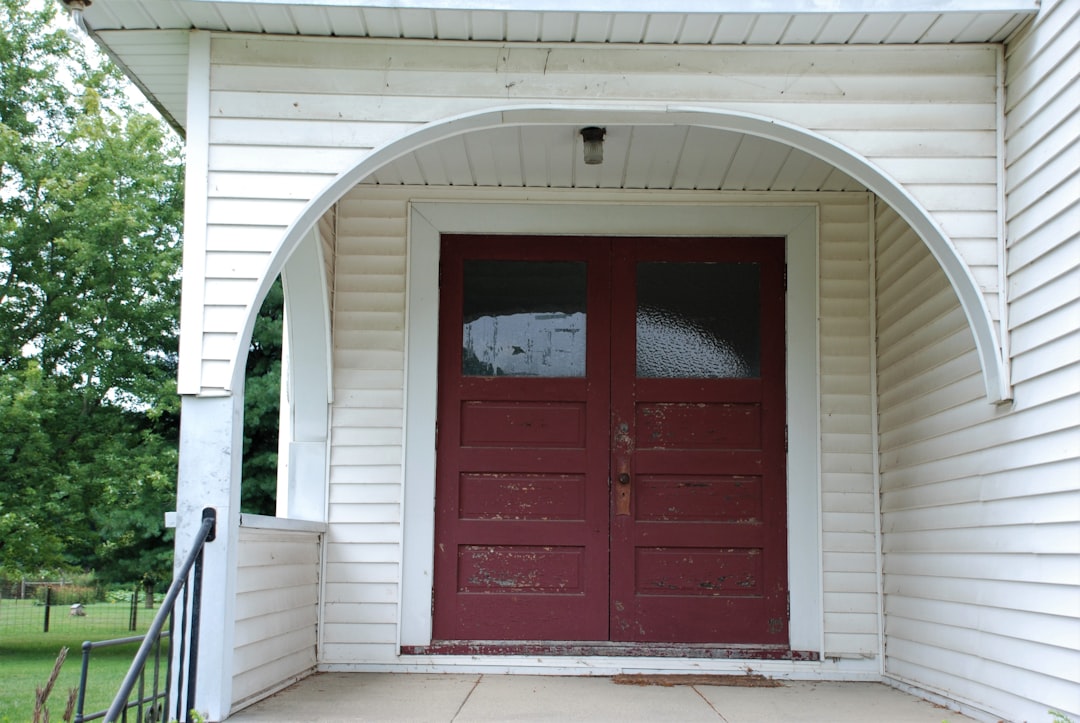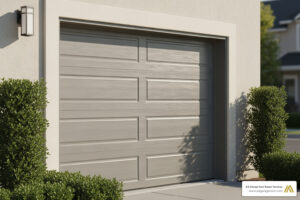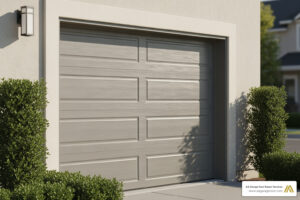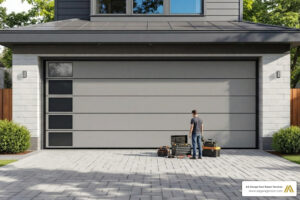Understanding Your Garage Door Opener Install Cost
A new garage door opener is a game-changer for convenience and security, but understanding the price can be confusing. As local experts providing reliable garage door services since 2001, we’ve created this guide to explain the costs. The garage door opener install cost typically ranges from $218 to $539, with a national average of $378. However, the final price can vary significantly based on the type of opener, horsepower, and extra features you choose.
Quick Cost Breakdown:
- Chain-drive openers: $150-$250 (unit only)
- Belt-drive openers: $160-$350 (unit only)
- Screw-drive openers: $150-$300 (unit only)
- Jackshaft openers: $500-$750 (unit only)
- Labor costs: $150-$400 (2-6 hours at $65-$85/hour)
- Total installed cost: $300-$900+ depending on features
Whether you’re dealing with a broken opener or upgrading to a quieter model, understanding these costs helps you budget properly and avoid surprises. The price difference between opener types can be substantial – a basic chain-drive might cost $400 installed, while a premium jackshaft system with smart features could exceed $1,200.
I’m David Sands, owner of AA Garage Door LLC, and I’ve been helping Twin Cities homeowners steer garage door opener install cost decisions since 2001. With over 23 years of experience installing everything from basic chain-drives to smart Wi-Fi enabled systems, I understand exactly what drives these pricing differences and how to help you get the best value for your investment.
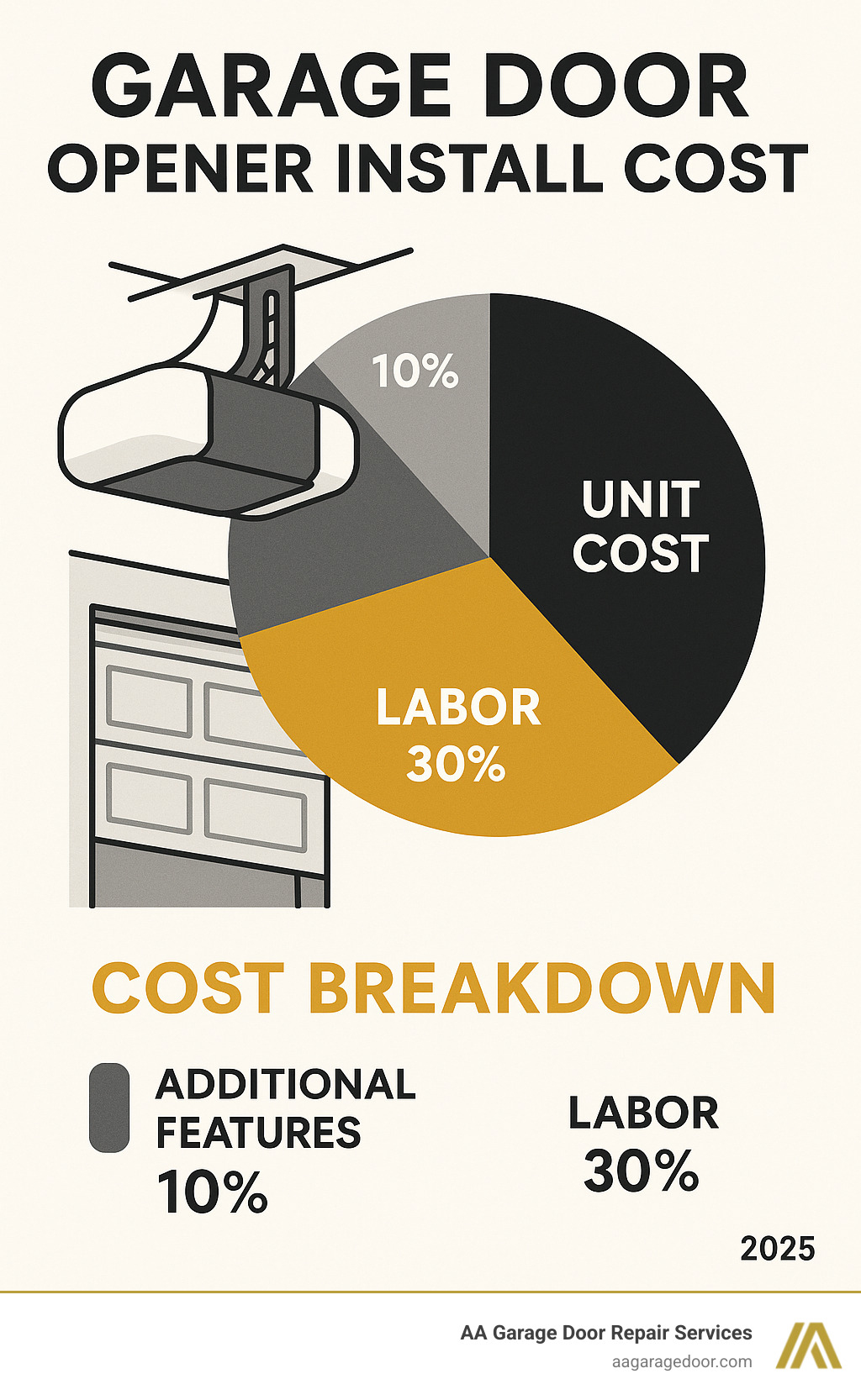
Basic garage door opener install cost glossary:
Breaking Down the Total Garage Door Opener Install Cost
Understanding garage door opener install cost means looking beyond just the sticker price. You’re actually paying for three main components: the opener unit itself, professional installation labor, and any additional features or electrical work needed. While the national average sits around $378, your actual investment typically falls between $218 and $539.
Here in the Twin Cities and Western Wisconsin, we’ve seen costs align closely with these national figures, though some premium installations can reach $849 or more. The higher end typically reflects smart features, premium brands, or complex installation requirements. When we provide our services to Minneapolis and St. Paul homeowners, we always break down exactly what you’re paying for.
The key is separating unit costs from labor costs. Think of it like buying a new appliance – you pay for the machine itself, then pay someone to install it properly. While some homeowners consider the DIY route, professional installation ensures safety and warranty protection that’s worth every penny.
Replacement versus new installation can affect your final price too. If you’re replacing an existing opener and the wiring looks good, you might save a bit. But new installations often need additional electrical work, which adds to the total investment.
The Opener Unit Itself: What Are You Paying For?
The opener unit represents the biggest chunk of your garage door opener install cost, typically ranging from $150 to $800 or more. Several factors drive this wide price range, and understanding them helps you make the right choice for your home and budget.
Brand reputation plays a huge role in pricing. We work with trusted names like LiftMaster Garage Door Openers, Chamberlain, and Genie – brands that have earned their reputation through years of reliable performance. Premium manufacturers often cost more upfront but deliver superior durability, quieter operation, and advanced features that justify the investment.
Horsepower ratings directly impact both performance and price. A basic 1/2 HP unit works fine for standard single doors, while 3/4 HP motors handle heavier wood or double doors. If you have an oversized or particularly heavy door, you might need 1+ HP, which increases the unit cost by $30 to $100 per horsepower level.
Most new openers include essential accessories in the box: one or two remote controls, a wired wall console, and federally required safety sensors. However, extras like additional remotes, wireless keypads, or smart features add to the base price.
Warranty coverage varies significantly between brands and models. Look for motor warranties ranging from one year to lifetime coverage, plus parts warranties typically spanning one to five years. A strong warranty signals manufacturer confidence and protects your investment long-term.
Labor Costs: The Price of Professional Installation
Professional installation typically costs between $150 and $400, based on hourly rates of $65 to $85 and installation times of two to six hours. The complexity of your specific job – whether it’s a straightforward replacement or a completely new installation – determines where you’ll fall in this range.
Standard labor includes everything needed for a complete, safe installation. Your technician will assemble and mount the opener unit securely to your garage ceiling, ensuring perfect alignment with your door’s track system. They’ll install the rail system that guides your door’s movement and handle all the technical details you shouldn’t tackle yourself.
Safety sensor alignment is crucial and requires professional expertise. These sensors prevent your door from closing on people, pets, or objects – a life-saving feature that must work perfectly every time. Professional installers also program all remote controls and the wall console, then thoroughly test everything to ensure smooth, reliable operation.
If you’re replacing an old opener, expect an additional removal fee of $20 to $60. While this might seem like an extra cost, it includes proper disposal of your old unit and saves you from wrestling a heavy, awkward machine out of your garage yourself. Most homeowners find this small fee well worth the convenience and peace of mind.
Key Factors That Influence Your Final Price
When you’re budgeting for your garage door opener install cost, the sticker price on the opener unit is just the starting point. Several key factors can push your final bill higher or help you save money, depending on the choices you make.
The biggest decision you’ll face is choosing the right type of opener for your specific situation. This choice alone can swing your costs by hundreds of dollars and dramatically affect your daily experience with the system.
| Opener Type | Average Unit Cost | Noise Level | Maintenance Needs | Best For |
|---|---|---|---|---|
| Chain-Drive | $150 – $250 | Noisy | Regular lubrication | Budget-conscious, heavy doors, detached garages |
| Belt-Drive | $160 – $350 | Quiet | Low | Attached garages, rooms above garage |
| Screw-Drive | $150 – $300 | Less Quiet | Less, temp sensitive | Fast operation, fewer moving parts |
| Direct-Drive | $280 – $500 | Very Quiet | Low | Premium quiet operation, low overhead space |
| Jackshaft/Wall-Mount | $500 – $750 | Ultra-Quiet | Low | High ceilings, unique garages, space saving |
Garage Door Opener Types and Their Costs
Think of choosing a garage door opener like picking a car – you can get from point A to point B with any model, but the ride quality, noise level, and price tag vary dramatically.
Chain-drive openers are the workhorses of the garage door world. They’re budget-friendly, incredibly reliable, and can handle even the heaviest wooden doors without breaking a sweat. The trade-off? They sound like a freight train rumbling through your garage. If your garage is detached or you don’t mind a bit of mechanical symphony, these are fantastic value for the money.
Belt-drive openers are where you start paying for peace and quiet. Instead of that clanking metal chain, they use a reinforced rubber belt that whispers your door open and closed. If you have bedrooms above or next to your garage, this upgrade is worth every penny. Your family will thank you when they’re not jolted awake by the 6 AM garage door wake-up call.
Screw-drive openers take a different approach entirely. They use a threaded steel rod – imagine a giant screw – to move your door. With fewer moving parts, they’re faster and need less maintenance than chain drives. However, they can be finicky in extreme temperatures, and while quieter than chains, they’re not whisper-quiet like belt drives.
Direct-drive openers represent the premium quiet option. The motor itself travels along the rail, eliminating most of the mechanical noise. They’re incredibly smooth, virtually silent, and built to last. The higher price reflects this engineering elegance.
Jackshaft or wall-mount openers are the sports cars of garage door openers. Mounted on the wall beside your door instead of hanging from the ceiling, they free up overhead space and operate with almost supernatural quietness. They’re perfect for garages with high ceilings, car lifts, or when you want a clean, uncluttered look overhead.
How Horsepower Affects Your Garage Door Opener Install Cost
Horsepower isn’t just a number on the spec sheet – it’s what determines whether your opener will struggle through each cycle or effortlessly handle your door for years to come. Getting this wrong can turn a smart investment into an expensive mistake.
1/2 HP motors are the sweet spot for most standard single-car garage doors. If you have a lightweight aluminum or basic steel door, this provides plenty of power without unnecessary cost. Most homeowners fall into this category, and these openers offer the best balance of performance and price.
3/4 HP motors step up to handle the heavy lifting – literally. If your door is insulated, made of heavier materials, or spans two car spaces, this extra power prevents the motor from straining. Wood doors, in particular, benefit from this additional muscle. The extra $30 to $50 you’ll spend upfront can save you hundreds in premature motor replacement down the road.
1+ HP motors are for the big leagues – oversized doors, solid wood construction, or doors with multiple layers of insulation. These powerhouses ensure smooth operation even with the most demanding doors. While they cost $50 to $100 more than standard motors, they’re essential insurance against costly breakdowns.
Choosing underpowered equipment is like asking a compact car to tow a boat trailer – it might work for a while, but you’re setting yourself up for expensive problems. The door weight and material should drive this decision, not just the initial price difference.
Additional Features and Potential Extra Costs
Modern garage door openers have evolved far beyond simple up-and-down functionality. Today’s smart features can transform your garage into a connected, convenient part of your home – but they’ll also impact your garage door opener install cost.
Smart connectivity has become the most popular upgrade, and for good reason. Wi-Fi-enabled openers let you control your door from anywhere, check if you remembered to close it, and even receive alerts when someone comes home. These systems typically add $50 to $150 to your opener cost, but the peace of mind is priceless when you’re lying in bed wondering if you closed the garage.
Garage Door Opener Battery backup systems are like insurance for power outages. Nobody wants to be trapped in their garage during a storm or unable to get their car out during an emergency. These systems add $50 to $80 to your total cost but can be lifesavers when the power goes out.
Extra Garage Door Remotes and wireless keypads address the practical reality of family life. Most openers come with one or two remotes, but families often need more. Additional remotes run $20 to $40 each, while wireless keypads for code-based entry cost $20 to $70. These eliminate the “honey, where’s the garage remote?” conversations.
Extension kits become necessary if your garage door is taller than the standard 7 feet. Many modern homes have 8-foot doors, requiring rail extensions that add $45 to $85 to your installation cost. This isn’t optional – it’s required for proper operation.
New electrical wiring can be a hidden cost that catches homeowners off guard. If your garage lacks a properly positioned outlet or needs updated wiring, expect to pay $10 to $25 per linear foot plus electrician labor. This is especially common in older homes where the electrical system hasn’t kept pace with modern opener requirements.
The key is balancing convenience with budget. Start with the essentials – proper horsepower and opener type – then add features that genuinely improve your daily life rather than just checking technology boxes.
DIY vs. Professional Installation: A Cost and Safety Analysis
When considering your garage door opener install cost, one of the biggest decisions homeowners face is whether to tackle the job themselves or hire a professional. While DIY might seem like a way to save money, it’s crucial to weigh the true costs and, more importantly, the significant safety implications.
The True Cost of a DIY Installation
On the surface, doing it yourself seems like a no-brainer. You save on labor costs, which can range from $150 to $400. However, this is often a deceptive saving.
- Required Tools Cost: Unless you’re a seasoned DIYer with a fully stocked workshop, you’ll likely need to purchase specialized tools, such as winding bars (if you’re working with springs, which we strongly advise against), specific wrenches, and potentially a ladder. These tool purchases can quickly eat into your “labor savings.” One source suggests DIY projects, including equipment, can cost $400-$1,500.
- Time Investment: Installing a garage door opener isn’t a quick task. Professionals typically complete the job in two to six hours because they do it every day. For a DIY enthusiast, it could take an entire weekend, or even longer, especially if unexpected issues arise.
- Risk of Improper Installation: Garage door openers are complex systems that need precise alignment and calibration. An improperly installed opener can lead to:
- Damage to the door or opener: Misalignment can cause the door to bind, leading to wear and tear on both the door and the new opener, potentially voiding warranties.
- Frequent malfunctions: Incorrect limit settings or force adjustments can cause the door to open or close improperly, or reverse unexpectedly.
- Shortened lifespan: Constant strain from improper installation will drastically reduce your opener’s expected 10-15 year lifespan.
- Dangers of Garage Door Springs: This is perhaps the most critical safety concern. The springs on a garage door are under extreme tension and can cause severe injury or even death if mishandled. While the opener itself doesn’t directly interact with the springs, installing an opener often involves working around them or ensuring the door is balanced, a task that relies heavily on proper spring tension. We cannot stress enough: DO NOT attempt to work with garage door springs without professional training and specialized tools. This alone makes professional installation worth every penny.
- Electrical Hazards: If your installation requires new electrical wiring, you’re venturing into potentially dangerous territory. Improper wiring can lead to electrical shocks, fires, or damage to your home’s electrical system.
- Hidden Costs: The true cost of DIY can include hospital bills from injuries, the expense of repairing damage caused by improper installation, or ultimately, having to call a professional to fix your DIY attempt (often at a higher cost than if you had called them first!). For a deeper dive into home repairs, you might find a Guide to Home Repair helpful, but always remember the specific dangers of garage doors.
The Value of Hiring a Professional
Investing in professional installation is an investment in safety, efficiency, and peace of mind.
- Guaranteed Workmanship: Reputable companies like AA Garage Door stand behind their work. We offer warranties on our labor, typically for a year, ensuring that if any issues arise due to the installation, we’ll fix them.
- Efficiency and Speed: Our technicians are experienced and equipped to handle any installation quickly and correctly. What might take you all weekend, we can often complete in a few hours.
- Correct Tools and Parts: We come prepared with all the necessary specialized tools and any additional parts that might be needed, ensuring a seamless installation.
- Liability Insurance: Accidents happen, but when you hire a professional, their liability insurance protects you and your property from any damage or injury that might occur during the installation process.
- Peace of Mind: Knowing that your garage door opener has been installed by certified experts, according to safety standards, and with a warranty, provides invaluable peace of mind. It means your family is safe, and your investment is protected.
For expert and safe Garage Door Installation services, we are always here to help.
Frequently Asked Questions about Garage Door Opener Costs
After helping thousands of homeowners with their garage door opener install cost decisions over the past two decades, I’ve noticed the same questions come up again and again. Let me share the answers to the most common ones we hear at AA Garage Door.
How long does a garage door opener last?
Here’s some good news for your wallet: a quality garage door opener typically lasts 10 to 15 years with proper care. That means when you invest in a new opener today, you’re looking at over a decade of reliable service before you need to think about replacement again.
But here’s the thing – not all openers reach that full lifespan. Usage frequency plays a huge role. If your garage door is your main entry point and you’re opening it four or five times a day, it’s going to wear out faster than one that only gets weekend use. Most openers are rated for about 10,000 open and close cycles, so do the math based on your family’s habits.
Proper maintenance can add years to your opener’s life. Simple things like lubricating moving parts twice a year, keeping sensors clean, and having annual tune-ups can stretch that 10-year opener into a 15-year champion. It’s like changing the oil in your car – a little preventive care goes a long way.
The horsepower match between your opener and door weight is critical too. An underpowered opener working constantly at maximum capacity is like running a marathon in high heels – it’s not going to end well. That’s why we always size the opener properly during installation.
When you factor in this 10-15 year lifespan, even a $500 opener installation breaks down to just $33-50 per year. That’s less than most people spend on coffee in a month for the convenience and security of automatic garage door operation.
What factors most impact the garage door opener install cost?
The type of opener drive system is hands down the biggest factor affecting your garage door opener install cost. A basic chain-drive might run you $300 installed, while a premium jackshaft system could hit $1,200 or more. That’s the difference between a reliable work truck and a luxury sedan – both get you where you’re going, but the experience is very different.
Motor horsepower comes in second. Stepping up from 1/2 HP to 3/4 HP typically adds $50-100 to your total cost, but it’s essential if you have a heavy wooden door or double-wide garage door. Think of it as buying the right size engine for your needs.
Brand reputation also plays a role. Premium manufacturers like LiftMaster command higher prices because they’ve earned trust through decades of reliable performance. You’re paying for engineering, testing, and warranty support that cheaper brands simply can’t match.
Smart features and battery backup are increasingly popular add-ons. Wi-Fi connectivity and smartphone control typically add $50-150 to your cost, while battery backup systems add another $50-80. These aren’t just fancy gadgets – they’re genuinely useful features that many homeowners consider essential once they have them.
Installation complexity can surprise some homeowners. If your garage needs new electrical wiring, extension kits for tall doors, or has challenging mounting conditions, labor costs can increase significantly. That’s why we always do a thorough assessment before providing quotes.
Is it cheaper to repair or replace a garage door opener?
This is probably the question that keeps homeowners up at night when their opener starts acting up. The answer depends on your opener’s age and what’s actually wrong with it.
Here’s my 50% rule: if the repair cost exceeds half the price of a new opener installation, replacement usually makes more financial sense. For example, if fixing your old opener costs $250 but a new one installed runs $450, spending the extra $200 for a brand-new system with a full warranty is often the smarter choice.
Age matters tremendously. If your opener is 8+ years old and having its second or third major repair, it’s probably trying to tell you something. At that point, you’re often throwing good money after bad, like continuing to repair a 15-year-old car that breaks down monthly.
Minor repairs are almost always worth it. Replacing worn gears ($75-125), fixing safety sensors ($50-100), or programming new remotes ($25-50) can give you several more years of reliable service. These fixes address normal wear items without breaking the bank.
Major component failures tell a different story. When the main circuit board fries (often from power surges), the motor burns out, or multiple systems fail simultaneously, replacement becomes the logical choice. These repairs can easily cost $200-400, and there’s no guarantee other components won’t fail shortly after.
Our technicians can diagnose the problem and give you honest repair versus replacement recommendations. We’ve been serving the Twin Cities since 2001, so our reputation depends on giving you advice that’s truly in your best interest. For comprehensive troubleshooting help, check out our Garage Door Opener Repair services.
The bottom line? Age plus repair cost should guide your decision. A 5-year-old opener with a $150 repair? Fix it. A 12-year-old opener needing $300 in work? Time to upgrade.
Get a Professional Garage Door Opener Installation in the Twin Cities
Choosing the right garage door opener is like finding the perfect balance between your budget, the features you actually need, and the peace of mind that comes with long-term reliability. While those national average costs we’ve discussed give you a solid starting point, the truth is that every home and situation is unique.
Maybe you’ve got a heavy wooden door that needs extra horsepower, or perhaps you’re tired of waking up the whole house every time someone comes home late. Whatever your specific needs, the best way to understand your actual garage door opener install cost is to get a detailed, personalized quote that takes into account your exact situation.
For homeowners throughout St. Paul, Minneapolis, and Western Wisconsin, AA Garage Door has been the trusted choice for professional installations since 2001. We believe in transparent pricing – no surprise fees, no hidden costs, just honest estimates that help you make informed decisions.
Our team understands the unique challenges of Minnesota winters and the specific needs of Twin Cities homeowners. Whether it’s a Saturday morning emergency or a planned upgrade, we’re available 24/7 to ensure your home stays secure and convenient. There’s something reassuring about working with a local company that’s been part of the community for over two decades.
Getting started is simple. For a precise, no-obligation quote custom to your specific needs and garage setup, we invite you to schedule your professional garage door installation through our website. We’ll work with you to find that perfect balance of convenience, security, and cost-effectiveness for your new garage door opener – because your home deserves nothing less than the best.

